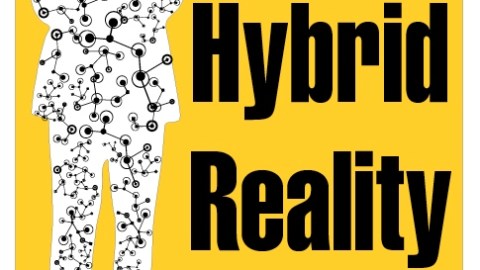What’s your Technology Quotient (TQ)?

A new era requires a new vocabulary. Will we still talk about the “mobile” phone when all phones are mobile, or when they are implanted within us? Does “evolution” really capture our deepening entanglement with technology today, or should we instead speak of human-technology coevolution? More broadly, will we really use the term “globalization” ad nauseamonce it truly encompasses all of us? Is geopolitics really the driver of power relations, or is it rather geotechnology? Does intelligent quotient (IQ) or even emotional quotient (EQ) matter more than technology quotient (TQ)?
Whether the future is a dystopian global class struggle over technology or a Pax Technologica of transparency, access and equity will depend on spreading TQ above all else. In our new book Hybrid Reality: Thriving in the Emerging Human-Technology Civilization, we explore the frontier of the information revolution: The Hybrid Age.
The Hybrid Age is the transition period between the Information Age and the moment of Singularity (when machines surpass human intelligence) that inventor Ray Kurzweil, author of The Singularity Is Near, estimates we may reach by 2040 (perhaps sooner). The Hybrid Age is a liminal phase in which we cross the threshold toward a new mode of arranging global society. The philosopher Karl Jaspers saw such times as both destructive and constructive, because our “unquestioned grasp on life is loosened” and we “ask radical questions.” Nicholas Negroponte of MIT, whose seminal 1995 book Being Digital foresaw the Internet as a “global social fabric,” now argues that the Internet is only a transitory instrument that facilitates the far deeper shift now under way. You may continue to live your life without understanding the implications of the still-distant Singularity, but you should not underestimate how quickly we are accelerating into the Hybrid Age nor delay in managing this transition yourself.
In this era of disruptive technologies, accelerating change, and deep anxiety about the future, we attempt to explain how the “balance of innovation” has superseded the military “balance of power” as a measure of national potential, and provide a global tour of how the smartest countries, cities, and companies are harnessing new technologies to gain an edge. Each of us also needs better TQ to adapt to a future in which robots are normal social actors in our lives, healthcare becomes a vehicle for physical enhancement, academic pedigree dissolves in a global skills market, and virtual currencies enable tax-free transactions.
The Hybrid Age is the era when we renew our thinking about technology with a big “T” not just gadgets such as the iPhone or the Web and its myriad applications like Facebook but rather all the scientific fields and their technological inventions. Technology is additive: It has evolved from our Stone Age invention of tools and our Neolithic cultivation of crops to the harnessing of steam power in the Industrial Revolution and the creation of the Internet in the Information Age. The great disruptive global trends of the 21st century the shift to multipolarity, shrinking of space, economic convergence, and new forms of collaboration all have technology at their root.
Technology is a double-edged sword, reducing burdens on some while creating them for others. Mobile phones are a great convenience for billions, but over the years millions of Africans have toiled in poisonous pits mining cobalt and other minerals that go into electronic parts. We enrich our social lives through co-design in social networks, but our privacy has been utterly compromised. Solar and wind power reduce the carbon footprint of our homes and offices, but horizontal drilling will give us access to enough fossil fuels to potentially last for decades more. The Carbon Age continues even as alternative energy flourishes. Telepresence saves time and money spent on travel and reduces emissions (Cisco has cut its intra-firm travel expenses by $100 million using its own product), but data server farms now consume as much electricity as the entire global aviation industry. It is legal in California for anyone to fly a commercial drone to survey land or film commercials, but drug cartels just use them to fly cocaine and other narcotics across borders. Collaborative online games bring together Israelis and Palestinians (as well as other youth from conflict parties) to appreciate each other’s viewpoints, but suicide bombings continue even in Second Life. (It is unclear what virtual martyrs are promised.) Nuclear power can heat homes and destroy nations. Both/and.
For more on the Hybrid Age, see our new book here.
Ayesha and Parag Khanna are Directors of the Hybrid Reality Institute, a research and advisory group that focuses on human-technology co-evolution, geotechnology and innovation.




